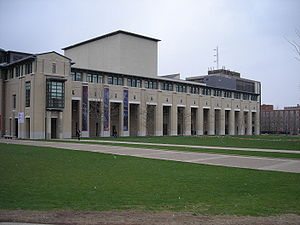U.S. President Barack Obama named Carnegie Mellon University computer scientist Luis von Ahn as a recipient of the Presidential Early Career Award for Scientists and Engineers (PECASE), the highest honor bestowed by the United States government on science and engineering professionals in the early stages of their independent research careers.
Von Ahn, 33, is the A. Nico Habermann Associate Professor of Computer Science at Carnegie Mellon. He was one of 96 PECASE recipients announced by the White House and was one of 20 recipients nominated by the National Science Foundation. The PECASE program recognizes scientists and engineers who, early in their careers, show exceptional potential for leadership at the frontiers of knowledge.
Another CMU faculty member, John Kitchin, associate professor of chemical engineering, also is a PECASE recipient. Kitchin was nominated for the award by the Department of Energy’s Office of Fossil Energy.
“Discoveries in science and technology not only strengthen our economy, they inspire us as a people,” President Obama said. “The impressive accomplishments of today’s awardees so early in their careers promise even greater advances in the years ahead.”
Von Ahn was cited “for innovative research in human computation applied to complex tasks that advance the field of machine translation while simultaneously helping people learn a second language, and for outstanding teaching and mentoring as well as successful efforts to translate scientific discovery into beneficial commercial products.”
His research enables humans and computers to work together to solve problems that neither humans nor computers could solve alone. He launched his most recent innovation, Duolingo.com, just last month. The free website, which he created with Severin Hacker, a Ph.D. student in computer science at CMU, teaches users a foreign language; as those users practice their new skills, they are translating online texts and thus making the Web accessible to more people worldwide. The site features computer tools that enable these foreign language learners to translate text as well as a professional.
“Luis von Ahn has had a string of spectacular successes in developing computer-based systems that combine the efforts of many (even hundreds of millions) people to do useful work, ranging from digitizing books to translating Web pages,” said Randal E. Bryant, dean of Carnegie Mellon’s School of Computer Science. “We are very proud of his accomplishments and the recognition he is receiving via the PECASE award.”
In 2007, von Ahn used his crowdsourcing approach to create the online puzzles known as reCAPTCHAs, which reduce spam and protect websites from automated, malicious programs. When people solve the puzzles, they simultaneously digitize words from pre-computer-age books and periodicals. So far, more than a billion Internet users have solved reCAPTCHA puzzles and millions of books have been made suitable for search and for reading on any digital device.
He also created Games with a Purpose, which harness human gameplay to tackle challenging problems beyond the current capability of computers, such as image recognition.
Von Ahn, earned his doctorate in computer science at Carnegie Mellon in 2005 and joined the faculty of its Computer Science Department in 2006. He currently holds the Habermann Development Chair in Computer Science, which is awarded every three years to a junior faculty member of unusual promise in Carnegie Mellon’s School of Computer Science.
He has received numerous awards, including a MacArthur Fellowship in 2006, a Packard Fellowship and Sloan Research Fellowship in 2009, and the Association for Computing Machinery’s Grace Murray Hopper Award earlier this year. Last year, Spanish Foreign Policy magazine named him the most influential new thought leader of Latin America and Spain.



